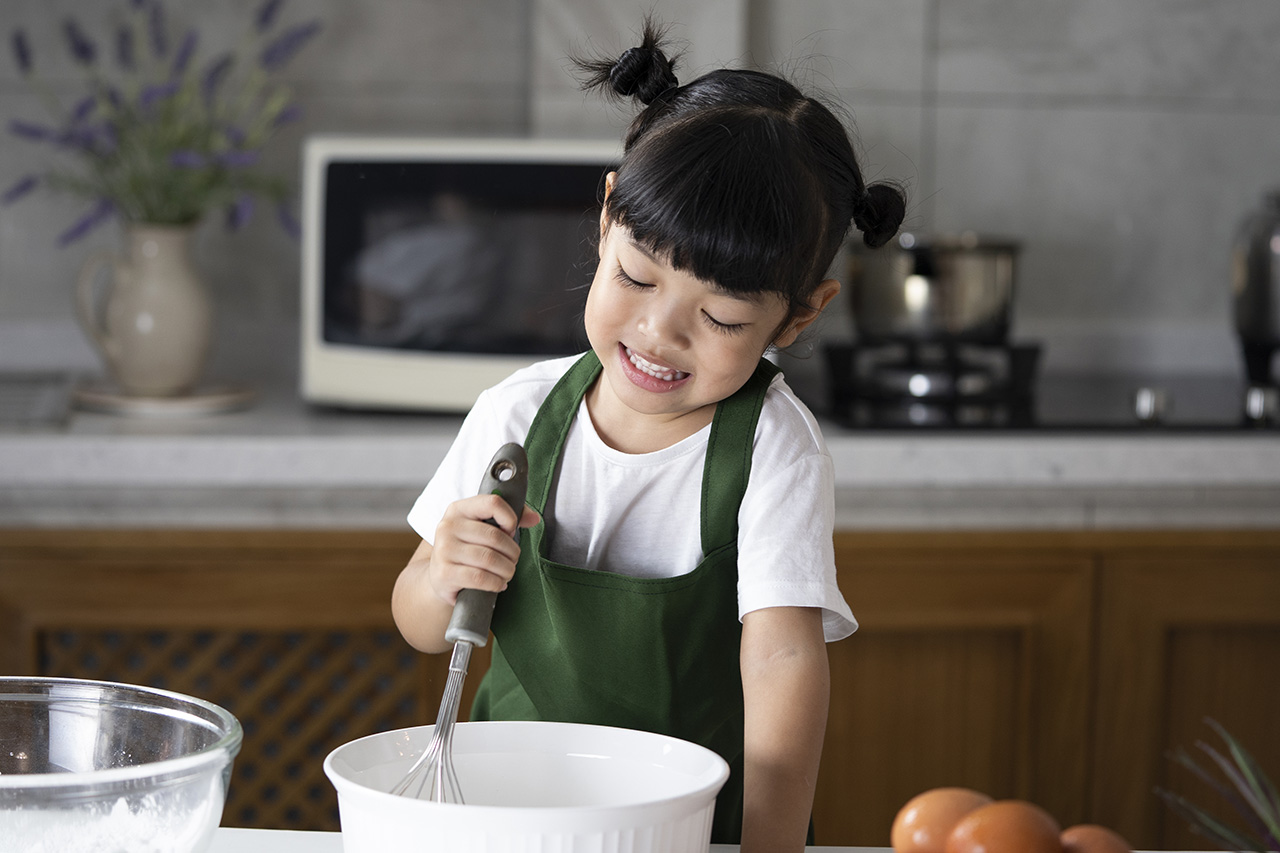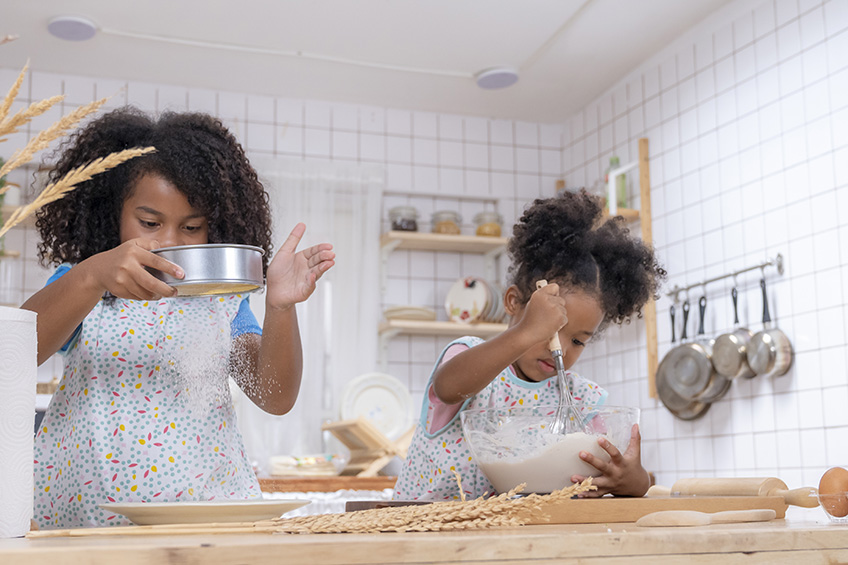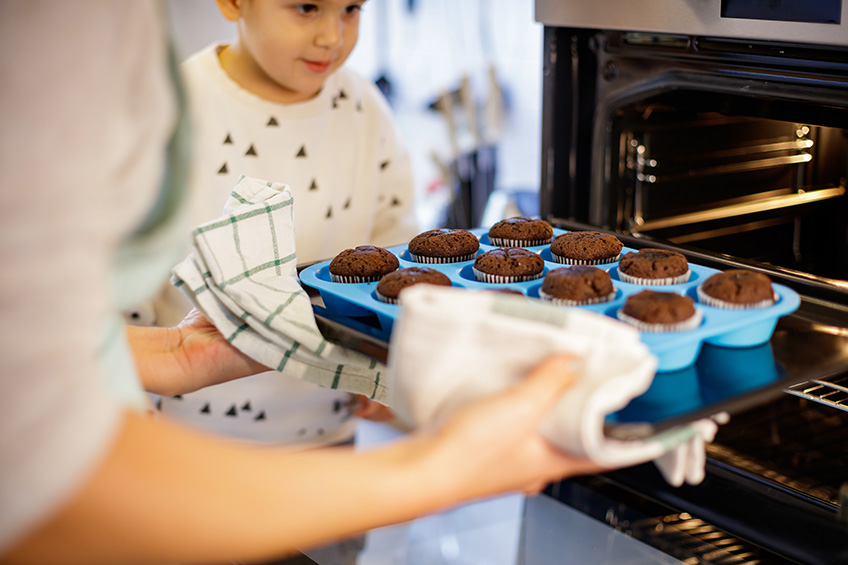
Some of my favourite childhood memories involve baking with my grandmothers. I took pride in knowing they trusted me to help them make their delicious cookies, cakes and treats (intricately prepared sometimes weeks in advance of special holidays). I may have been too young to read my grandmas’ beautifully handwritten recipes, but I was more than capable of helping them squeeze the skin off blanched almonds, crack and whisk eggs, use a mortar and pestle to grind walnuts or biscuits, use cookie cutters — and yes, sample the delicious results! This love of baking has since evolved to include learning from other matriarchs in my family, and this is now the same joy I feel when I share what I know with the littles in my life.
Related: Anna Olson Shares Her Best Baking Tips (Home Bakers, Read On!)
Part of what’s stayed with me is that with trust comes responsibility. I learned early on that some things are too hot to touch, too sharp for careless handling, and that there is a specific order to certain tasks (always make sure you first connect blender attachments before plugging that blender into the outlet).
So if you’re looking to share and pass down a similar love of baking to your budding beginner baker, you’ll want to first arm them with skills to safely navigate the kitchen and their baking adventures — not just to prevent accidents but also to help them build good habits now and in the future. This is knowledge that can serve them a lifetime.
Related: 10 Best Baking Recipes for Beginners
Catch up on Kids Baking Championship on Food Network Canada. Stream Live or On-Demand with STACKTV. Try it free today!
1. Go over basic kitchen safety rules in advance
Before jumping into any baking projects, first have a chat with your budding beginning baker about the general ground rules of using the kitchen. You’ll want to mention things like:
Related: A Beginner’s Guide to Baking – Bake It Till You Make It

Getty Images
2. Know where potential kitchen and baking hazards lie ahead of time
As the adult, you’ll need to prep too. You’ll want to make sure you’re aware of where potential hazards are in your kitchen, and you’ll want to ensure a safe, clear workspace for your little ones to work in. Also have a first aid kit and a fire extinguisher nearby (and know how to use them).
3. Choose developmentally-appropriate recipes
Don’t immediately jump to macarons, croquembouche, or croissants. Your budding baker should be involved in choosing the recipe, if possible, so they can feel a sense of ownership and excitement over the project. You may want to browse the recipes together or you can offer them a pre-selection of options. Start off with easy recipes that are hard to mess up, and gradually work on building up to more complex ones. Try some of these kid-friendly bakes!
4. OR allow them to work on developmentally-appropriate tasks
Even for more complex recipes, children can still participate in the baking process. Depending on where they are developmentally, you may want to allow them to:
Of course, kids develop at different speeds and at different times, so pay more attention to your specific child’s development than their age when it comes to choosing what’s developmentally appropriate for them.
5. Teach good preparation
Read through the recipe together fully in advance, making sure you understand the instructions. Prepare everything you need (ingredients, bakeware, utensils) before cracking that first egg. Setting up for success with prep (or the mise en place as it’s called in a professional kitchen) is arguably even more important than what you do with the directions at this stage.
6. Introduce tools and their safe handling in a gradual way
Teach your wee one how to handle sharp utensils they will eventually use anyway in a safe way. There are specialty kid-safe knives, but you can also work up slowly using duller knives working with soft items like bananas, while discussing how to chop and cut and how to keep little fingers safely out of harm’s way.
You may also want to provide child-sized tools, to allow little hands to better navigate the recipe and to reduce the risk of accidents.
For any skill you’re trying to impart, you’ll want to break it down into its simpler components and introduce them bit by bit, once the child has mastered each one, progressively.
Related: Our Favourite Cooking Tools for Kids and Toddlers

Getty Images
7. Work up to heat
Similarly, work up to handling hot items like pots and pans, and remind your protege to always be cautious around heat – be it from a microwave, stovetop, oven, pan or container or hot liquids and ingredients. Show them how to safely handle anything coming out of the oven, how to test baked goods for doneness with a toothpick (not your hands), and to always allow things to cool properly. Explain why oven mitts are a must.
8. Teach good hygiene and cleaning as you go
Wipe any slippery spills immediately, and put in the sink what you no longer need. Show them to only use a tool once if it’s been in contact with raw ingredients like eggs and to then wash it right away. It’s also a good reminder to never put ready-to-eat food where raw food was.
Similarly, explain why double-dipping isn’t hygienic and teach them to sample with clean utensils only.
9. A note on allergies
Many children have food allergies these days, and it’s important to be aware of potential exposure to allergens both for your budding baker and for anybody else who may enjoy the treat. Kids often share and swap food without knowledge of their companion’s allergies so important to always discuss ingredients and who may be enjoying the treat at a later time.
Cross-contamination of allergens is a real risk in the kitchen so you want to avoid this. Dish detergent is the only thing that properly washes off allergens so this is yet another reason to tidy as you go.
Related: Cake Baking Mistakes You May be Making at Home
10. Mistakes will happen
Even with best efforts, recipes don’t quite turn out, dough doesn’t rise, and cookies can come out over-baked. Still, even these results can be delicious. Keep baking fun and lighthearted and turn mistakes and misses into learning opportunities. A dropped egg, some spilled milk and the like all come with the territory. But so long as they are being safe, such hiccups are easy to move past. Discuss what might have gone wrong. How can you prevent the mistake next time? Kids love learning through stories, and if you can weave in some anecdotes and personal experiences of when you were learning to navigate the kitchen, these are more likely to stick with them. Mistakes are how we all grow and improve, and with time who knows? You might have your next Kids Baking Champion on your hands. And even if you don’t, you’re helping build lifelong kitchen skills and memories to last a lifetime.
